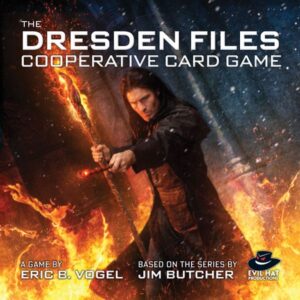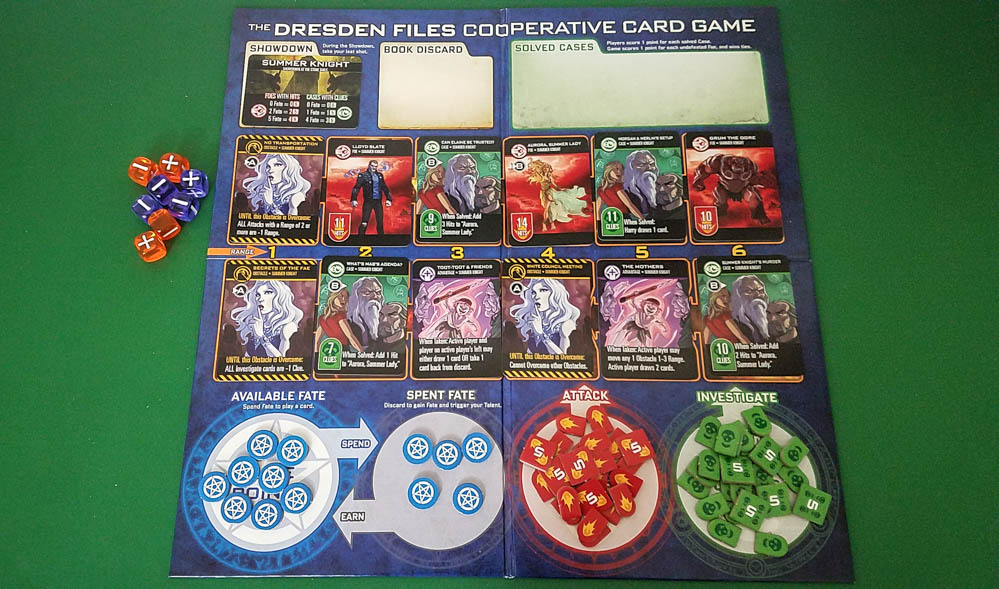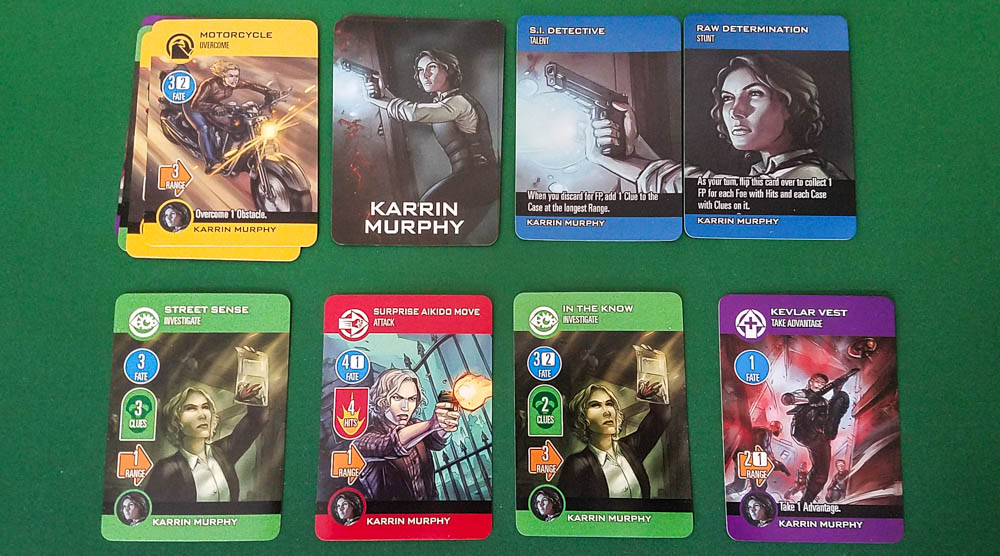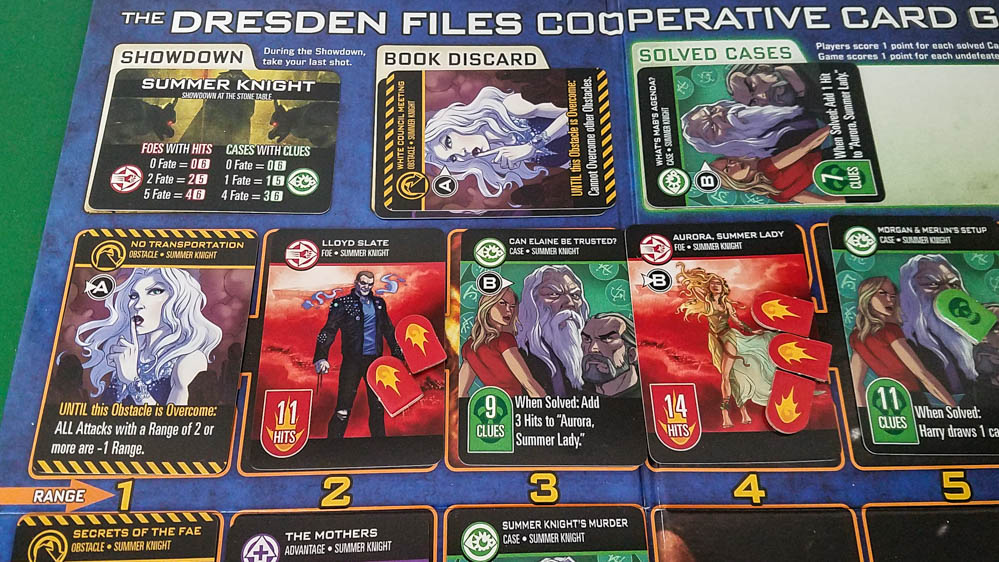The Dresden Files Cooperative Card Game Review
Year: 2017 | Players: 1-5 | Minutes: 30 | Ages: 13+
This The Dresden Files Cooperative Card Game review was made after playing the game about 15 times.
What is The Dresden Files?
The Dresden Files Cooperative Card Game is a fantasy/mystery hand management game in which you use your cards to investigate cases and fight enemies. There are five “Book” scenarios that you can play through and each one is based on one of the first five The Dresden Files novels.
The Dresden Files Cooperative Card Game was designed by Eric B. Vogel and is published by Evil Hat Productions.
Rules Overview
In The Dresden Files Cooperative Card Game, your goal is to use your cards to gather clues for the cases you’re investigating, fight some of the foes who are standing in your way, and ultimately end up with more solved cases than remaining foes on the board.
Each game you’ll choose one of the five Books to play through, or you can create a random Side Job scenario. The Book’s 12 cards are shuffled and put in two rows on the board, the two cards furthest to the right being the furthest away from your characters at range 6.
The Book decks contain Case, Foe, Obstacle, and Advantage cards. Your main focus is dealing with the cases and foes, but you usually have to take out the obstacles first since they limit what you can do on your turn. The Advantage cards give you different types of benefits when they’re removed.
Each of the five characters in the game has a unique 12-card deck as well as a Talent and a Stunt ability. The decks are made up of Investigate, Attack, Overcome, and Take Advantage cards. You use Investigate cards to put clue tokens on cases, Attack cards are for fighting foes, Overcome cards are for the obstacles, and Take Advantage cards are played to remove Advantage cards.
Fate is the currency in the game. Each card costs a certain number of Fate points to play and some cards require you to roll Fate dice, which can add to or subtract from the Fate values.
You have four options on your turn: play one card, discard a card for its Fate value, use your character’s Stunt ability, or pass by spending one Fate point. When you play a card, you pay its Fate cost and you check its range to see how far down the two rows the ability can reach. When you discard a card, you not only gain its Fate points, you also get to use your character’s unique Talent ability. Your character’s Stunt is his or her best ability, but it can only be used once per game. You don’t get to draw cards at the end of your turn, but there are some cards and abilities that allow players to draw new cards.
This isn’t a full-on limited communication game, but you aren’t allowed to tell other players exactly what you have in your hand. You can talk about the strengths and weaknesses of your hand in general terms, but you can’t state specific numbers, like Fate costs or investigate/attack values.
Each game ends with a Showdown phase, which is your last chance to solve cases and take down foes. The Showdown is triggered if a player can’t afford the Fate cost of a card (due to a bad Fate roll), if a player has to pass and there are no Fate points left, or if you decide as a group to trigger it. For each remaining case and foe with a hit/clue token on it, you roll dice and see how many successes you can get.
You’ll win if there are more solved case than foes remaining on the board at the end of the Showdown.
Pros and Cons
Pros
- The Fate system is what makes The Dresden Files feel like a unique co-op game to me. Since Fate is a shared resource, it encourages players to cooperate in a way that you don’t see in most other co-ops. You naturally want to spend the Fate to use the powers on your cards every turn, but you have to think about what’s best for your group if you want to win. That often means discarding cards to add more Fate to the pool so other players can afford to use their best cards. It works to give players a team-first mentality.
- Another great thing about the game is that it gives you different puzzles to solve every time it hits the table. The Book cards are randomly arranged every game, you can choose different character teams (though Harry Dresden is always included), and the dice force you to constantly adjust your strategies. There’s plenty of replay value here.
- I really like the Stunt and Talent cards. The character decks are all slightly different, but it’s the Stunts and Talents that really make each character feel unique. The Stunts are especially cool because you only have one chance to use them and it’s very satisfying when you can time them perfectly.
- I didn’t think I’d like the Showdown phase, but it’s actually a great way to bring some added excitement to the end of most games. It also gives you a chance to pull off some last-second wins if you didn’t play well during the game. Most of my group’s games had close finishes – we’ve won about half of them on standard difficulty – and I’ve never felt like the randomness of the dice ruined the experience in any way.
- The games are quick and have a great flow to them. Once everyone is used to the iconography, turns are very snappy. Even five-player games take right around 30 minutes most of the time.
- The communication restrictions work to add some nice tension to everyone’s turns and to minimize quarterbacking. Since you don’t know exactly what’s in other players’ hands, it’s really tough for one player to tell everyone else what to do.
- The rulebook is excellent. It’s well-written and it includes plenty of gameplay examples, some card clarifications, and even some strategy tips.
Cons
- I’m not a huge fan of The Dresden Files as a two-player co-op game. Each player has to mix two character decks together, which can result in some pretty bad initial hands since you only draw nine of your 20 cards. In one of our games we only ended up with two low-value Investigate cards between us, which made that game pretty much impossible. It’s playable as a two-player game, but it’s a lot better for three, four, or five players, in my opinion.
- It’s pretty disappointing that there’s so much repeat artwork on the Book and character cards. Each image works for one card and often doesn’t make sense for the other cards of that type, such as Karin’s “Surprise Aikido Move,” which just shows her shooting a gun. I think the card art is great, but I wish there was more of it.
Final Thoughts
I like The Dresden Files Cooperative Card Game a lot, and this is coming from someone who has never read any of the novels. I can almost guarantee that fans of the novels will get more out of this game than I do, but I like it because I get a full (and fun) board gaming experience from a game that only takes about 30 minutes to play. The Fate system and the communication restrictions combine to create a unique co-op, which is why this game has been in my collection for over two years now.
I definitely recommend giving this game a shot if you’re a fan of The Dresden Files, but I also recommend it to anyone who enjoys playing co-op puzzle board games. There really aren’t too many other cooperative filler games like this out there right now.
The Dresden Files Cooperative Card Game Links
BGG | Amazon | Miniature Market
Thanks for taking the time to read our The Dresden Files Cooperative Card Game review!
To stay updated on all things cooperative board games, follow us on Twitter, Facebook, or via RSS.




